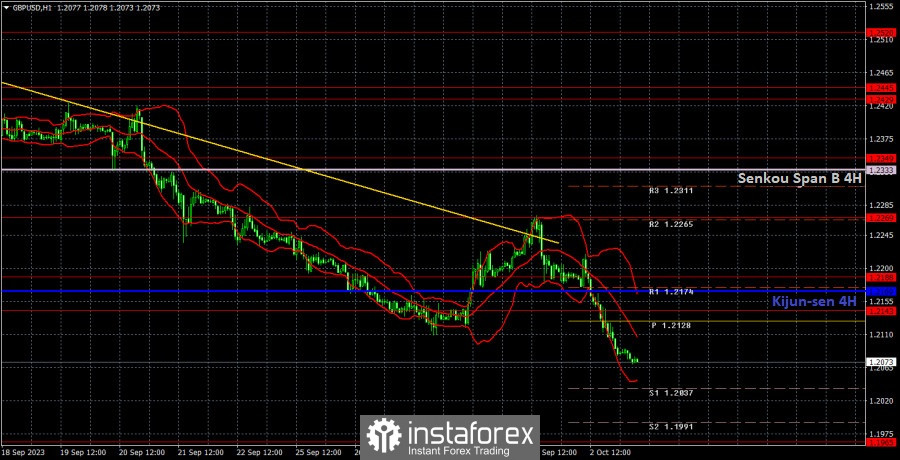Analysis of GBP/USD 5M
GBP/USD traded lower to kick off the Monday session, although we intended to say that the pair "continued to rise." Let's be honest: for a long time, we have practically demanded a strong, powerful, and prolonged decline from the British currency, but on Monday, we expected the pound to correct higher – GBP has significantly moved lower in the last two months. Nevertheless, the market actively bought the pound from January to June-July (although there were hardly any reasons for this), and now, for the third consecutive month, investors are actively getting rid of the currency. Yesterday, there were no reasons for the British pound to fall by 100 pips. Yes, the British Manufacturing Purchasing Managers' Index (PMI) was not at its peak, and the American Institute for Supply Management (ISM) Index was slightly better than expected, but clearly, this was not enough for such a sharp decline in the pound. However, in the medium term, everything is predictable.
Speaking of trading signals, we can highlight the following: during the European session, prices initially settled above the critical line and then below it. In the first case, it rose by more than 20 pips, so a Stop Loss should have been set at breakeven for long positions. Then a sell signal was formed, and all subsequent signals were also sell signals, so only one short position should have been opened, and it should have been manually closed closer to the evening. The profit was about 60 pips.
COT report:
According to the latest report on GBP/USD, the non-commercial group closed 300 long positions and opened 17,700 short ones. Thus, the net position of non-commercial traders decreased by another 18,000 contracts in a week. The net position indicator has been steadily rising over the past 12 months, but it has been firmly decreasing over the past two months. The British pound is also losing ground. We have been waiting for many months for the sterling to reverse downwards. Perhaps GBP/USD is at the very beginning of a prolonged downtrend. At least in the coming months, we do not see significant prospects for the pound to rise.
The British pound has surged by a total of 2,800 pips from its absolute lows reached last year, which is an enormous increase. Without a strong downward correction, a further upward trend would be entirely illogical (if it is even planned). We don't rule out an extension of an uptrend. We simply believe that a substantial correction is needed first, and then we should assess the factors supporting the US dollar and the British pound. A correction to the level of 1.1843 would be sufficient to establish a fair equilibrium between the two currencies. The non-commercial group currently holds a total of 84,700 longs and 69,000 shorts. The bears have been holding the upper hand in recent months, and we believe this trend will continue in the near future.
Analysis of GBP/USD 1H
On the 1H chart, GBP/USD quickly ended its long-awaited bullish correction. The pound, as before, is poised to go downward. So, we do not believe that its decline in 2023 is over. The only thing is that we would have preferred to see a stronger correction than what we saw. However, the market decided not to take a long break and it immediately led the pair towards fair values. And these values are below the current levels.
As of October 3, we highlight the following important levels: 1.1760, 1.1874, 1.1927-1.1965, 1.2143, 1.2188, 1.2269, 1.2349, 1.2429-1.2445, 1.2520, 1.2605-1.2620, 1.2693. The Senkou Span B (1.2333) and Kijun-sen (1.2169) lines can also be sources of signals. Signals can be "bounces" and "breakouts" of these levels and lines. It is recommended to set the Stop Loss level to break-even when the price moves in the right direction by 20 pips. The Ichimoku indicator lines can move during the day, which should be taken into account when determining trading signals. The illustration also includes support and resistance levels that can be used to lock in profits from trades.
On Tuesday, there are no interesting events lined up in the UK. The US will release the JOLTS report on job openings. It is a fairly important report, but we don't foresee any significant impact on traders' sentiment when they have already made up their minds to sell.
Description of the chart:
Support and resistance levels are thick red lines near which the trend may end. They do not provide trading signals;
The Kijun-sen and Senkou Span B lines are the lines of the Ichimoku indicator, plotted to the 1H timeframe from the 4H one. They provide trading signals;
Extreme levels are thin red lines from which the price bounced earlier. They provide trading signals;
Yellow lines are trend lines, trend channels, and any other technical patterns;
Indicator 1 on the COT charts is the net position size for each category of traders;
Indicator 2 on the COT charts is the net position size for the Non-commercial group.













